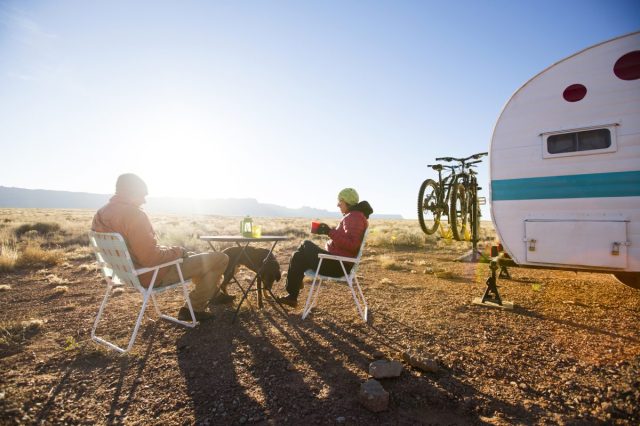Camping offers an opportunity for relaxation and reconnection with nature — but the privilege to spend time enjoying and living in the great outdoors comes with great responsibility.
When campers neglect to leave no trace and fail to embrace a mindset of environmental stewardship, it can lead to lasting damage and a diminished experience for others.
By practicing sustainable camping habits, you can help to preserve the beauty of the outdoors and ensure that future campers can continue to enjoy the same unspoiled landscapes.
Need directions to your campsite? Let AAA guide the way.
Embracing Sustainable Camping
Camping has been growing in popularity over the past few years. More Americans went camping in 2023 and 2024 than in prior years, and more than 21 million people went for the first time since 2021, according to the annual camping report by The Dyrt, a camping app.
All those campers can strain natural resources, which is why interest in sustainable camping, also known as eco-friendly or low-impact camping, has been on the rise as well, especially with younger generations.
More than half of Millennial and Gen Z campers say they’re willing to pay more for an outing that prioritizes sustainability, according to Kampgrounds of America’s 2025 Camping and Outdoor Hospitality Report.
“Campgrounds are, by nature, deeply connected to the land,” said Jenny McCullough, associate vice president of brand growth at Kampgrounds of America. “KOA campgrounds rely on healthy ecosystems to deliver the experiences campers seek,” she explained. “We believe sustainability isn’t a trend — it’s a responsibility to ensure future generations can enjoy and connect with the outdoors.”
Each of Kampgrounds of America’s more than 500 campgrounds across North America take a tailored approach to sustainability.
“Many have introduced eco-friendly features such as water refill stations, solar power installations and comprehensive recycling programs,” said McCullough.
The organization’s Kamp Green program also provides practical, easy-to-implement guidelines to help campgrounds reduce their environmental impact. These include ways to conserve energy and water, improve waste management and teach campers about responsible outdoor behavior.

Tips for Sustainable Camping
Campsites and many campers follow the 7 Principles of Leave No Trace. The golden rule of sustainable camping encourages visitors to leave their campsite as they found it — or even better — without leaving anything behind, guided by core principles developed by the U.S. Forest Service, National Park Service and Bureau of Land Management.
Here are recommendations for eco-friendly camping based on the 7 Principles of Leave No Trace and tips from Kampgrounds of America.
- Pack less, use less. The key to sustainable camping is to bring and use as few supplies as possible and leave nothing behind but footprints. “If you pack sustainably, you will camp sustainably,” according to guidelines from the New York State Department of Environmental Conservation.
- Camp close to home so you use less fossil fuel traveling.
- Bring only essentials. If you can, borrow equipment rather than buy new.
- Leave the plastic bags at home. Pack food in reusable containers and then do the same with leftovers. You can even crack eggs and put them in a glass jar before you leave home. This will occupy less space in a cooler and you can leave the egg crate at home.
- Pack dry goods and other supplies in canvas or paper bags rather than plastic.
- Bring reusable plates, cups and utensils. Don’t bring plastic water bottles.
- If possible, buy local produce and firewood.
- Do not cut vegetation on your campsite or anyplace in the campground.
- Respect wildlife. Don’t approach animals or pick up rocks or plants. Take photos instead.
- Do not dump any waste into rivers or streams.
- Be mindful of where you build a campfire to prevent fire from spreading or damaging nearby trees.
- Separate waste into bags for garbage and recycling.
- Don’t leave anything behind except footprints!
“Sustainable amenities resonate strongly with today’s campers, especially younger generations and families with children,” said McCullough. “For these guests, eco-conscious travel isn’t optional — it’s expected.”
















